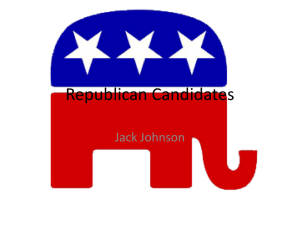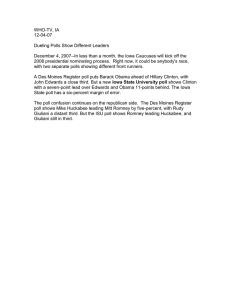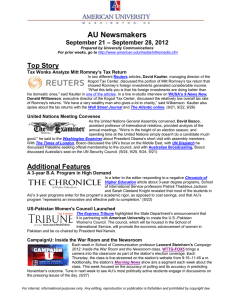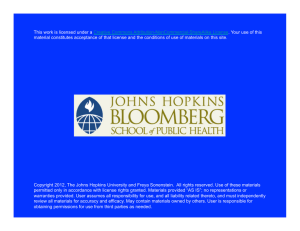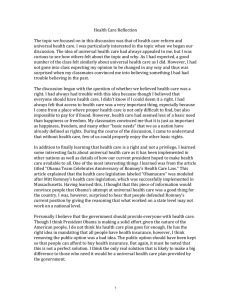Leadership and the 2012 Election
advertisement
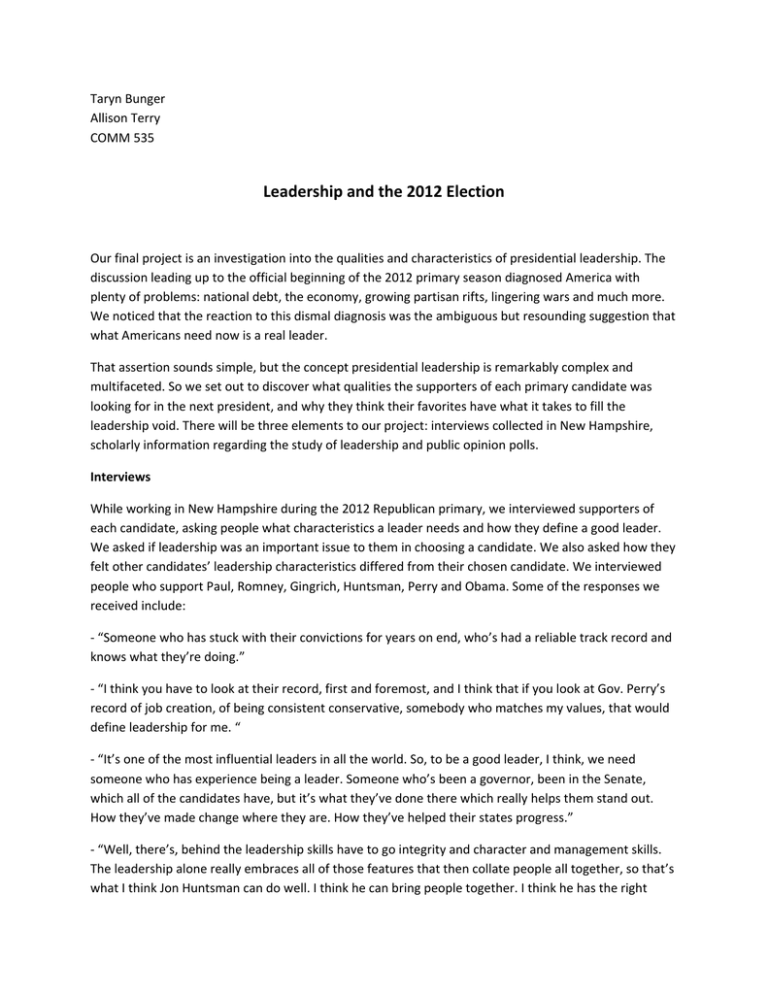
Taryn Bunger Allison Terry COMM 535 Leadership and the 2012 Election Our final project is an investigation into the qualities and characteristics of presidential leadership. The discussion leading up to the official beginning of the 2012 primary season diagnosed America with plenty of problems: national debt, the economy, growing partisan rifts, lingering wars and much more. We noticed that the reaction to this dismal diagnosis was the ambiguous but resounding suggestion that what Americans need now is a real leader. That assertion sounds simple, but the concept presidential leadership is remarkably complex and multifaceted. So we set out to discover what qualities the supporters of each primary candidate was looking for in the next president, and why they think their favorites have what it takes to fill the leadership void. There will be three elements to our project: interviews collected in New Hampshire, scholarly information regarding the study of leadership and public opinion polls. Interviews While working in New Hampshire during the 2012 Republican primary, we interviewed supporters of each candidate, asking people what characteristics a leader needs and how they define a good leader. We asked if leadership was an important issue to them in choosing a candidate. We also asked how they felt other candidates’ leadership characteristics differed from their chosen candidate. We interviewed people who support Paul, Romney, Gingrich, Huntsman, Perry and Obama. Some of the responses we received include: ‐ “Someone who has stuck with their convictions for years on end, who’s had a reliable track record and knows what they’re doing.” ‐ “I think you have to look at their record, first and foremost, and I think that if you look at Gov. Perry’s record of job creation, of being consistent conservative, somebody who matches my values, that would define leadership for me. “ ‐ “It’s one of the most influential leaders in all the world. So, to be a good leader, I think, we need someone who has experience being a leader. Someone who’s been a governor, been in the Senate, which all of the candidates have, but it’s what they’ve done there which really helps them stand out. How they’ve made change where they are. How they’ve helped their states progress.” ‐ “Well, there’s, behind the leadership skills have to go integrity and character and management skills. The leadership alone really embraces all of those features that then collate people all together, so that’s what I think Jon Huntsman can do well. I think he can bring people together. I think he has the right attitude to engage people who are different opinions and different ideas, and yet, bring them into the tent and create a compromise situation that advances the cause of the general public and not just his own political agenda.” ‐ “One of the things Newt talks about, he says, ‘I have to ask you to be with me in this campaign, not for me because we need to do this together.’ And I think that’s a sign of a good leader because a leader has to have a group they bring along with them to lead.” Scholarly work Back in D.C. after the primary, we decided to add a more formal research component to our project to provide a scholarly insight into the qualities and characteristics of presidential leadership. To further inform our understanding of the complexities of presidential leadership, we looked to the Washington Post series “On Leadership”,which contains an article, dated just days after the New Hampshire primary, assessing the best leadership traits of the candidates at that time (Gingrich, Huntsman, Paul, Perry, Romney and Santorum). These leadership characteristics are listed below: • • • • • • Newt Gingrich’s intelligence, especially his understanding of complex issues and the country’s place in history. Jon Huntsman’s independent thinking, diplomatic temperament and his moderate values. Ron Paul’s consistency, authenticity, and ability to make voters feel like he trusts them. Rick Perry’s charisma, confidence and enthusiasm. Mitt Romney’s pragmatism, flexibility and fact‐driven style. Rick Santorum’s resilience, discipline, consistency, and conviction‐driven approach. We also conducted an in‐depth interview with David M. Abshire, President and CEO of the Center for the Study of the Presidency and Congress in Washington, D.C. Mr. Abshire defined our aspects of leadership: transformative, strategic, organizational and character. Character, he said, is the bedrock of strong and effective leadership. This assessment of the importance of character leadership worked with our analysis of New Hampshire exit polls as well as recent polls to develop the conclusion of our project’s narrative arc. Public opinion polls Analyzing public opinion from exit polls serves two purposes in our project. First, since exit polls are available after every primary they provide perspective that is specific to the political moment we witnessed during our time in New Hampshire. Second, they give us the opportunity to add a quantitative element to our largely qualitative project and allow us to make projections about elements of leadership that may prove pivotal in the general election. In the New Hampshire exit polls, 35% of those polled said that the quality that most mattered in their voting decision was the ability to defeat Barack Obama in the general election. Of those 35 percent who think electability is most important, 63 percent voted for Mitt Romney. However, in a recent Washington Post‐ABC News poll, 51% of respondents declared that if Romney wins the Republican nomination, they will vote for Obama, with only 43% responding that they will vote for Romney. (Post‐ ABC Poll) As Mitt Romney emerges as the likely GOP frontrunner, character leadership is gaining attention as a factor that may influence votes in November. The majority of respondents in the same Post‐ABC poll replied that they think Obama is a stronger leader, seems more likable, has a clearer vision for the future, is more inspiring and is more consistent than Romney. (Post‐ABC Poll) Conclusion In conclusion, our project follows the arc of leadership so far in the 2012 election by: 1) Establishing a context for what leadership means and how it is studied 2) Assessing the leadership characteristics that each Republican candidate who competed in the New Hampshire primary exhibits 3) Learning how the public defines leadership and the significance of strong leadership characteristics in determining how they cast their votes through in‐depth personal interviews and exit poll data 4) Analyzing recent poll data and the narrowed field of candidates to determine the role that leadership characteristics might play in the coming campaigns and the November 2012 election
